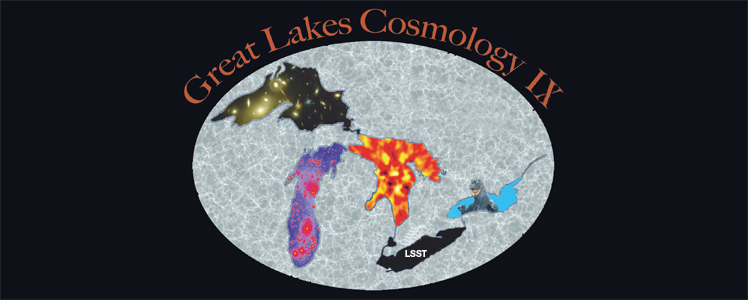
Scientific Program
In keeping with the goal of encouraging the broadest possible participation from young researchers in Great Lakes institutions, the detailed scientific program has been largely driven by the topics which participants choose to present. The detailed program is below. It is preferred that presentations at GLCW9 be directly relevant to one of the following topics:
- Large Scale Structure (including CMB and galaxy clusters)
- Cosmological Simulations
- Cosmological Data Analysis (including dark matter detection)
- Astroparticle/Early Universe
Contributed talks will be limited to 12 minutes, plus an additional 3 minutes for questions. In addition, contributed talks will be supplemented by slightly longer (25+5 min) talks from distinguished faculty of several Great Lakes Institutions.
Talks are grouped into ten ~1.5 hour sessions comprising both contributed talks by GLCW9 participants and talks by invited speakers. In order to ensure compliance with the schedule, time limits will be strictly enforced, so we request that you plan accordingly. There will also be a poster session.
Copies of the talks (slides only) presented at GLCW9 will be made available on-line at this web site.
Plenary speakers include:
John Beacom (Ohio State University) , Rachel Bean (Cornell University), Cliff Burgess (Perimeter), Jane Charlton (Pennsylvania State University), Douglas Clowe (Ohio University), August Evrard (University of Michigan), Joshua Frieman (Fermilab/Chicago), Lev Kofman (CITA), Bhuvnesh Jain (University of Pennsylvania), Jeffrey Newman (University of Pittsburgh), Ue-Li Pen (CITA), David Weinberg (Ohio State University), Michael Wood-Vasey (Harvard, University of Pittsburgh)
Location
The workshops will take place in the Carnegie Mellon University Center. Unless posted otherwise, all talks will be held in the Rangos rooms on the second floor.
Schedule
Sunday June 8
6-9 p.m.: Registration / Reception - Rangos Auditorium
A buffet meal will be provided at the reception.
Monday June 9
9-10:30 a.m.: Session I
10:30-11 a.m.: Coffee Break
11 a.m.-12:45 p.m.: Session II
12:30-2:30 p.m.: Lunch Break
2:30-4 p.m.: Session III
4-4:30 p.m.: Coffee Break
4:30-6 p.m.: Session IV
Tuesday June 10
9-10:30 a.m.: Session V
10:30-11 a.m.: Coffee Break
11 a.m.-12:45 p.m.: Session VI
12:30-2:30 p.m.: Lunch Break
2:30-4 p.m.: Session VII
4-4:30 p.m.: Coffee Break
4:30-6 p.m.: Session VIII
6:30-9:30 p.m.: GLCW9 Banquet - Carnegie Museum
Wednesday June 11
9-10:30 a.m.: Session IX
10:30-11 a.m.: Coffee Break
11 a.m.-12:45 p.m.: Session X
Oral presentation program
(*=30 min talks, others 15 min)
Session 1 Mon 9am-10:30am (Chair: Ryan Scranton)
Fred Gilman, CMU, Welcoming remarks
*August Evrard, Michigan, Challenges for Galaxy Cluster Cosmology
*Bhuvnesh Jain, Penn, Tests of dark energy and gravity with lensing
Xinghai Zhao, Notre Dame, Effects of Structure Formation on the Apparent Expansion Rate of the Universe
Graziano Rossi, Penn, Peak Statistics in the WMAP Sky: Non-Gaussianity?
Session 2 Mon 11am-12:45pm (Chair: Jeff Newman)
*Josh Frieman, Fermilab/UChicago, First Results from the SDSS Supernova Survey
*Michael Wood-Vasey Harvard/Pitt, Supernova Cosmology from Today and Tomorrow to the Future,
Infinity, and Beyond
Matt Kistler, Ohio State, What's the Deal with Supernovae?
Christopher Genovese, CMU, Nonparametric Inference for the Dark Energy Equation of State using Type Ia Supernova
Suman Bhattacharya, Pitt, Measuring Mean Pairwise Velocity from LSST Supernovae Survey
Session 3 Mon 2:30pm-4pm (Chair Rich Holman)
*Cliff Burgess, McMaster/Perimeter/CERN String Inflation
*Lev Kofman, CITA,TBA
Cristian Armendariz-Picon, Syracuse, Preheating with Derivative Couplings
Jimmy Hutasoit, CMU, Non-linear Dynamics in Axionic Inflation
Session 4 Mon 4:30pm-6pm (Chair: Arthur Kosowsky)
Session 5 Tue 9am-10:30am (Chair: Jeff Peterson)
Session 6 Tue 11am-12:45pm (Chair: David Turnshek)
Session 7 Tue 2:30pm-4:00pm (Chair: Tiziana Di Matteo)
Session 8 Tue 4:30pm-6pm (Chair: David Weinberg)
Session 9 Wed 9am-10:30am (Chair: Gus Evrard)
Session 10 Wed 11am-12:45pm (Chair: Rupert Croft)
Poster presentations
Matthew Bayliss, Chicago, Cluster-scale gravitational lenses.
Jonathan Dudley, McGill, Modelling the Vishniac Effect
Felipe Marin, Chicago, Galaxy bias from the LRG 3point correlation function
Chris Orban, OSU, Delving deeper into the tumultuous lives of galactic dwarfs: modelling star formation histories
Joseph W. Richards, CMU, Dimensionality Reduction and Efficient Inference for Astronomical Spectra
